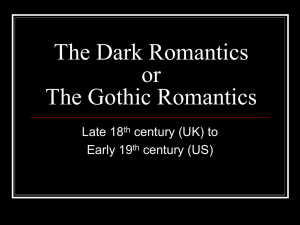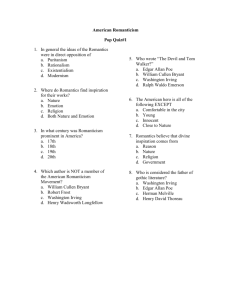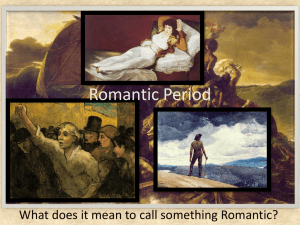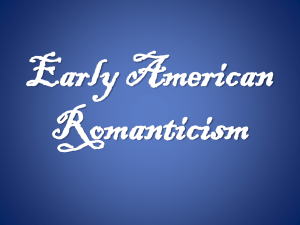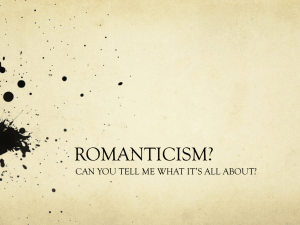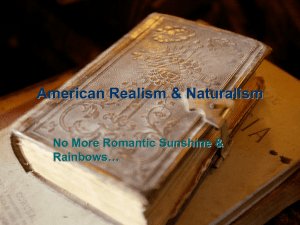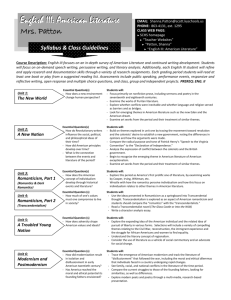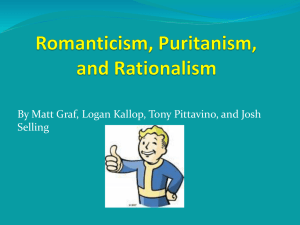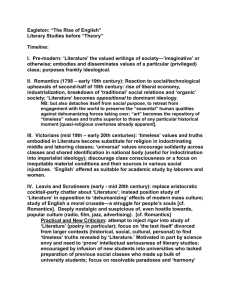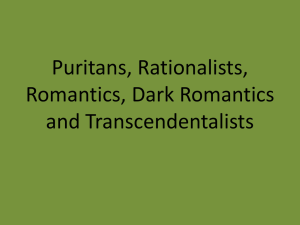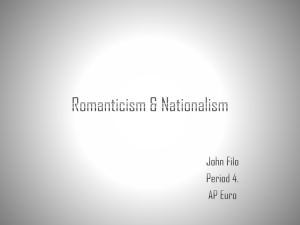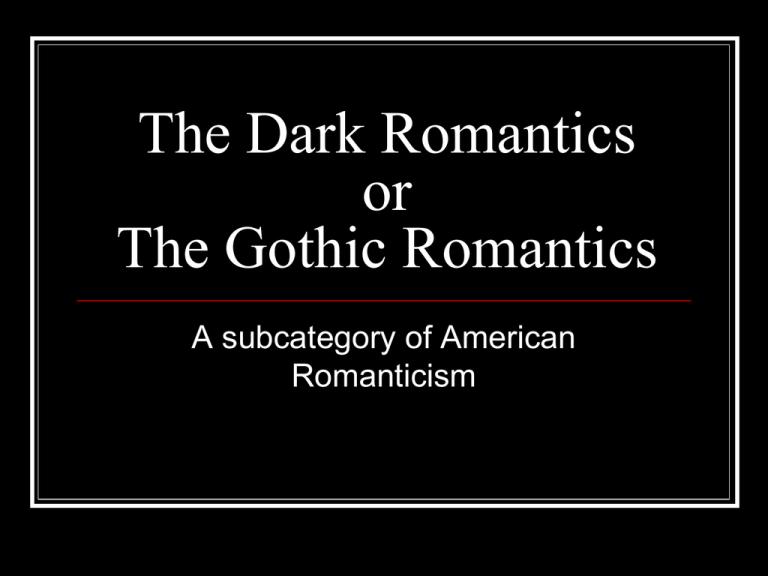
The Dark Romantics
or
The Gothic Romantics
A subcategory of American
Romanticism
Comparing Literature Ages
Remember….
Each successive age is a reaction to the
previous one.
Each previous age fails to see the
achievement of the successive age.
Using the chart on the next slide, explain
how Rationalists reacted to Puritanism.
Comparing Literature Ages
Puritanism
Rationalism
Faith
Reason
Authority
Skeptics
Theology
Science
Predestined Humanity
Self-made Humanity
The Romantic response to the
Rationalists and Industrialization…
Over-crowding
Urbanization
Factory life/work
Poverty
How do you think the Romantics would
respond to these issues in their stories?
Comparing Literature Ages
Puritanism
Rationalism
Romanticism
Faith
Reason
Extreme Emotions,
Insanity
Authority
Skepticism
Mystery, Suspense
Theology
Science
Supernatural, Occult
Legends, Dreams,
Wild Nature
Predestined
Humanity
Self-made
Humanity
Fate, Curses,
Omens
Beliefs of the Dark Romantics
1.
2.
3.
Dark Romantics are much less confident
about the notion that perfection or
idealism is an innate quality of mankind.
Presents individuals as prone to sin and
self destruction, not as inherently
possessing divinity and wisdom.
Frequently show individuals failing in their
attempts to make changes for the better.
Beliefs of the Dark Romantics
4. Romantics and Dark Romantics both
believe that nature is a deeply spiritual
force; however, Dark Romanticism views
nature as sinister and evil.
5. When nature does reveal truth to man, its
revelations are pessimistic and soulcrushing.
CHARACTERISTICS OF DARK
ROMANTICISM AND GOTHIC
LITERATURE
1. Importance of Setting
The setting is greatly influential in Gothic stories. It not
only evokes the atmosphere of horror and dread, but
also portrays the deterioration of its world.
The decaying, ruined scenery implies that at one time
there was a thriving world. At one time the abbey,
castle, mansion, or landscape was something treasured
and appreciated.
Now, all that lasts is the decaying shell of a once
thriving dwelling.
2. An Atmosphere of Mystery and
Suspense
Works are permeated by a threatening
feeling, a fear enhanced by the unknown.
Often the plot itself is built around a
mystery, such as unknown parentage, a
disappearance, or some other inexplicable
event.
3. Omens, Portents, Visions
A character may have a disturbing dream,
vision, or some phenomenon may be seen as a
portent of coming events.
For example, if the statue of the lord of the manor falls
over, it may portend his death.
Portent: A sign or warning that something, esp.
something momentous or calamitous, is likely to happen.
4. Supernatural or Otherwise
Inexplicable Events
Dramatic, amazing events occur, such as
ghosts or giants walking, or inanimate
objects (such as a suit of armor or
painting) coming to life
In some works, the events are ultimately
given a natural explanation, while in
others, the events are truly supernatural.
5. High, Even Overwrought
Emotion
The narration may be highly sentimental, and
the characters are often overcome by anger,
sorrow, surprise, and especially terror.
Characters suffer from raw nerves and a
feeling of impending doom.
Crying and emotional speeches are frequent.
Breathlessness and panic are common.
Abbreviated Dark Romanticism
Characteristics
Setting
is in bleak or remote places
Plot involves morbid or violent
incidents
Characters are in psychological and/or
physical torment
A supernatural or otherworldly
element is often present
Abbreviated Dark Romanticism
Characteristics
Very
pessimistic
Individuals are prone to sin and selfdestruction
Nature is dark, sinister, and
mysterious; man is flawed
Dark Romantic Heroes
Conflicted
Loner
Misunderstood by society
Spiritual
Talented or gifted in some way
Inspired by creativity and imagination rather
than society norms
Elements of Dark Romanticism
Drafty, old, family houses/castles
Mystery and suspense, finding dark secrets
Supernatural: ghosts, curses, monsters, etc.
Grisly death and gruesome murder
Omens, curses, dreams, legends
Extreme emotions of grief, passion, love
Instances of madness and insanity
References wild, dangerous nature
Mood: creepy, doom and gloom, terror
Edgar Allan Poe Biography
Directions:
1. Read Edgar Allan Poe’s biography on pages
450-453.
2.
Under each heading, list two main ideas from
that section. (Five headings = 10 facts) Make
sure you label each heading, then list the two
facts underneath the heading.
3.
After you finish answer, explain how Poe’s life
influenced his writing. How did his life fate him
to become a Dark Romantic writer?

